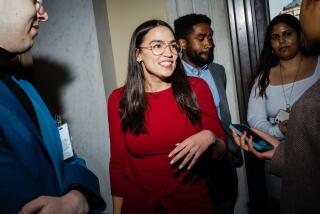Bush Agenda Will Be Tested on Russia Visit
- Share via
WASHINGTON — President Bush’s second-term pledge to promote democracy “in every nation and culture” will face a major test when he dives into the tangled diplomacy of the former Soviet Union during a four-nation trip starting Friday.
The centerpiece of Bush’s five-day trip will come Monday, when he joins Russian President Vladimir V. Putin at a military parade honoring Russia’s role in defeating the Nazis 60 years ago.
But Bush’s appearance with Putin at an event commemorating a glorious moment in Russia’s history will contrast sharply with the U.S. president’s activities before and after the parade, when he will travel to two former Soviet republics that now symbolize Russia’s shrinking influence.
Bush will meet Saturday in Latvia with the three Baltic presidents, two of whom are skipping the Moscow festivities because the Nazi defeat was followed by the Soviet occupation of their countries. All three Baltic nations -- Latvia, Lithuania and Estonia -- have provided troops for the war in Iraq that Putin opposed.
Bush will conclude his trip Tuesday by addressing 100,000 Georgians in their capital, Tbilisi, site of the so-called Rose Revolution that toppled President Eduard A. Shevardnadze and fueled the rise of the U.S.-educated President Mikheil Saakashvili, who is feuding with Putin over the future of Russian military bases in Georgia.
The mix of images and agendas reflects the obstacles facing Bush as he pursues a foreign policy that, experts say, is proving far more nuanced than the lofty language he used in his Jan. 20 inaugural address, when he declared it U.S. policy to spread democracy with “the ultimate goal of ending tyranny in our world.”
U.S. officials are trying to pressure the Russian leader to reverse his crackdown on the press and opposition leaders, and end his centralization of power in the Kremlin, while soliciting his help in combating the spread of nuclear weapons and terrorism. It is a balancing act that some critics say is preventing Bush from wholeheartedly pressing his democracy doctrine.
“Look, it’s a tricky world out there,” said Stephen Hadley, Bush’s national security advisor, during a briefing Wednesday at the White House. “There are a lot of challenges the world over.
“The president is going with a vision and a set of principles, and he’s very clear about that vision and comfortable with those principles, and he believes that those principles provide the framework by which various issues of the day can be resolved,” he said.
Bush’s trip, which begins in the Latvian capital, Riga, marks his third European visit this year, including last month’s funeral of Pope John Paul II in Rome.
A planned Sunday night summit and dinner between Putin and Bush will mark the presidents’ 14th meeting. It will be their first encounter since a tense February news conference in Slovakia, where Putin insisted that Russia was not stepping back from democracy and mentioned the U.S. electoral system, in which presidents are elected by the Electoral College and not directly by the people.
It was an apparent dig at Bush, who in 2000 won the Electoral College vote but not the popular vote.
The two men had enjoyed a warm rapport after their first meeting in 2001, but relations deteriorated as Putin imposed limits on the media, concentrated power in the Kremlin and considered changing the law so he could seek a third term -- while offering vague information on Russia’s role in Iran’s nuclear energy program and, most recently, agreeing to sell short-range antiaircraft missiles to Syria.
Bush has injected the United States into some of Russia’s most sensitive issues. This included supporting Viktor Yushchenko in last year’s elections on his way to becoming Ukrainian president, and advocating change in Belarus, sparking fears among Russian officials of U.S. encirclement.
On the eve of Bush’s trip, critics charged that his administration was sending mixed signals to Russia by seeming to establish a warm relationship with Putin while pressing him to allow greater democracy.
“If President Bush is serious about his message, then he can’t allow for this kind of mixed stuff to go on,” said Michael McFaul, a Russia expert at the Hoover Institution at Stanford University. “This is an administration that likes to stay on message. This is a case where there are two different messages.”
Dimitri K. Simes, a U.S.-Russia expert and former advisor to President Nixon who now heads the Washington-based Nixon Center, said Bush was trying to strike an “appropriate balance” in his relationship with Putin. But, Simes added, that balance is being thrown off kilter by some administration officials and democracy advocates who are quietly encouraging anti-Russian sentiment in the countries once occupied by the Soviets.
Simes said that by visiting Georgia, where Saakashvili is threatening to skip the 60th anniversary celebrations if he and Putin do not reach an accord on military bases, Bush risks getting caught up in a regional dispute and stoking fears inside Russia that his true motives are to hurt the United States’ former Cold War enemy.
More to Read
Sign up for Essential California
The most important California stories and recommendations in your inbox every morning.
You may occasionally receive promotional content from the Los Angeles Times.










